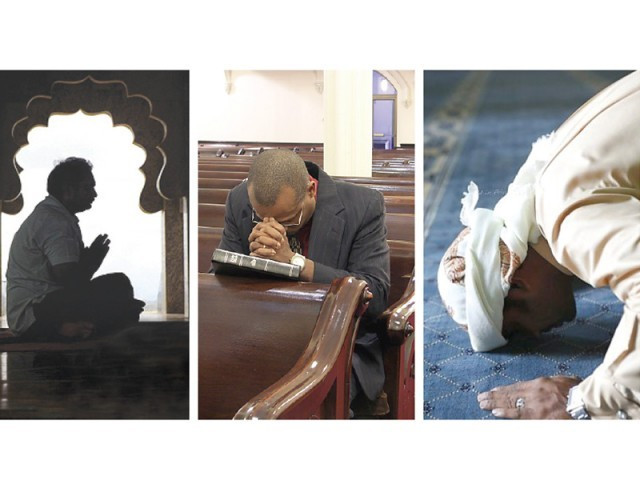There are only two possible outcomes in a theocracy:
1) Peaceful co-existence
2) Tyranny
The current situation of the authorities in Pakistan are a testimony to what becomes of a theocracy unsure of itself. One needs to look at history to see just how much man does not learn from his own past.
Whether one likes it or not, Christianity and Islam are one and the same when it comes to their historical successes - and mistakes. Allow me to elaborate.
For a few years after the death of Jesus Christ, there were no written accounts by any of the apostles, just orally memorised accounts of his life, works and words. Then over time, 30 years later, source documents were initiated followed by a brief period of analysis over which were 'sahih'- to borrow from the Muslim word for canonical - and which weren't. Intense insight by the greatest minds of the time including Ambrose, Anselm and Athanasius helped solidify what became the Creed and over time the Bible. The deuterocanonical books of the Bible became the 'others' that one could read for historical answers to rituals and rites.
Similarly, orally communicated words and works of Prophet Muhammad (Pbuh) were perfectly memorised and then put to pen and paper over the period of his later life and death, followed by the Hadiths undergoing various interpretative analysis to ensure their canonical value.
The Hadiths were for Muslims what the Acts of the Apostles are for us Christians. Just like in early Christian history, kings and emperors who believed in the faith as the one true faith for them ran their countries as theocracies, drawing laws and regulations from the Old and New Testaments, as well as their own legal systems. For a brief period of time, this served the purpose of the clergy and monarchies, and for some time the peasants believed this to be the only life they would have, as they believed in Christian law to be perfect for running a nation. No one questioned it.
Then, of course - as power usually does - the clergy became corrupt.
The Church saw its power questioned by both layman and fellow-clergy as well as the appointed rulers themselves, and a struggle for divine power over temporal power ensued. The results are clear for the world to see. The schisms took place, and Luther did what would have been unthinkable just 1,000 years earlier: he challenged the authority of Rome.
With Luther's exit began a mirror of Islam's situation today. Catholicism was identified as the mainstream Church which some argue as unchanged since Peter, and others argue as the corrupted but straightforward lineage of the Apostles. It is what one can call Christianity's 'Sunni' sect.
The Orthodox Patriarchy, Anglican Communion and Church of England can then be equated to the Shia sect of Islam. I say this because these major Churches all have some form of hierarchy or school of thought by which they set their standards, rituals and rites. Also, they all hold fast to tradition as well as doctrine. Just like the Sunni and Shia sects.
Then come the others. The Mormons (Church of Jesus Christ of Latter-Day Saints) can be equated at least in train of thought to the Ahmadis and finally the vast majority of Protestant churches of various sizes and denominations (some count to over 55,000) whose sole reason for being different is 'personal interpretation of Scripture'.
Sound familiar?
With the corruption of the Church in political affairs over the centuries, democratic, authoritarian, communist and other regimes began to take root and finally the West adopted a new form of governance: secular.
The separation of Church and state saved the Western world from the only thing that was eating away at it: religious dogmatism in state affairs, or rather, archaic laws based in politics that were a hodge-podge of Scripture, pagan philosophies and Greek thought.
Fast forward to the Islamic Republic of Pakistan.
For a greater period of its existence, Pakistan remained a peaceful theocracy where the masses were happy with the rule of law, mainly because of the balance between Shariah regulations and regular political mandate.
The sects were all there, as were a minority that consisted of Christians, Hindus, Ahmadis, Zoroastrians and others, and relative harmony and co-existence ensued. Then, however, we saw a repeat of the Church's marred history: a theocracy based in power more than ethic was enforced upon a people who until then were satisfied with the way things were. Divine writ was made the source of authority by a dictator, but based in a tone where defiance would result in death. With a standard set in divine stone, it gave birth to an ideology that would root itself into the mindset of a large part of the population that every aspect of governance should be 'Islam or bust'. Critical thought, liberal analytic and cultural diversity were all held hostage by a new clergy, but unlike the West's success in facing this elephant head-on, Pakistan lost its way.
Now, if one looks at all the problems that are rooted in religion here, one can see the mirrored mistakes:
1. Personal interpretation means anyone can be right
2. Questioning the divine writ means you are the 'other' and hence liable for persecution
3. The monarchy or the powers that rule pander to the religious right to keep the balance tilted in their favour
4. Any attempt for change is seen as tantamount to espionage and conspiracies
The problem, therefore, is simple:
Religious people - not religion - have ruined Pakistan.
The arguments are the same in response: Islam is not wrong, the people are corrupt today and only true Islam can save Pakistan. Fair enough, but that time has long since come and gone. You see, the fact is that the deep divisions in Pakistan's religious are dug so far down that it is now impossible for any unity without compromise, and just like Catholicism with Luther, compromise is impossible. Compromise will raise the spectre of self-doubt, which today's Muslims will abhor with a vengeance. Literally.
There is no greater example than the recent uprising in Bahrain, where the rift between Sunnis and Shias reached fatal proportions. Iraq is another blunt reminder of the same sectarianism which even now has not ebbed. Sectarian strife in Islam - at least for Pakistan, if not any other large Muslim country - is in the same situation that Christianity was in the Middle Ages up to the 19th century.
However, unlike the Western governments' success in separating Church and state and thereby creating a harmonious living environment for both atheists and theists of all leanings, Pakistan doesn't seem to want to let go of its dependence of divine writ.While one may argue that this secular thought gives rise to decadence, moral degradation and hedonism, the fact remains that in today's global village, it is the secular that are economic giants whose quality of life is seen as a destination of choice, with the majority of theocracies suffering economically, culturally and, yes, religiously.
And therein lies the fatal blow: who is Pakistan's Luther?
Who is Pakistan's Luther?
It is the religious people - not religion - who have ruined Pakistan. Clergy will always be corruptible.



COMMENTS
Comments are moderated and generally will be posted if they are on-topic and not abusive.
For more information, please see our Comments FAQ